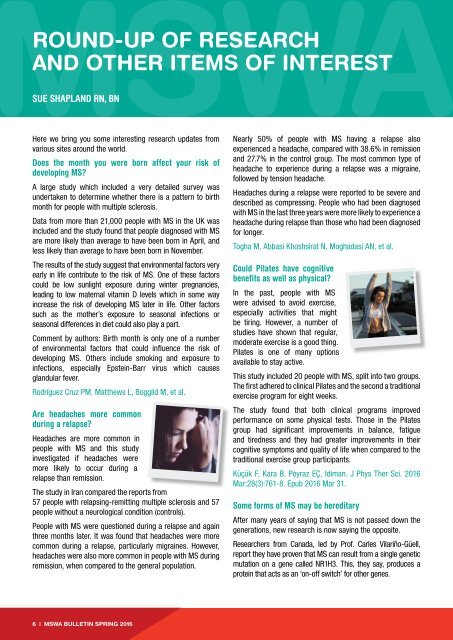Create successful ePaper yourself
Turn your PDF publications into a flip-book with our unique Google optimized e-Paper software.
ROUND-UP OF RESEARCH<br />
AND OTHER ITEMS OF INTEREST<br />
SUE SHAPLAND RN, BN<br />
Here we bring you some interesting research updates from<br />
various sites around the world.<br />
Does the month you were born affect your risk of<br />
developing MS?<br />
A large study which included a very detailed survey was<br />
undertaken to determine whether there is a pattern to birth<br />
month for people with multiple sclerosis.<br />
Data from more than 21,000 people with MS in the UK was<br />
included and the study found that people diagnosed with MS<br />
are more likely than average to have been born in April, and<br />
less likely than average to have been born in November.<br />
The results of the study suggest that environmental factors very<br />
early in life contribute to the risk of MS. One of these factors<br />
could be low sunlight exposure during winter pregnancies,<br />
leading to low maternal vitamin D levels which in some way<br />
increase the risk of developing MS later in life. Other factors<br />
such as the mother’s exposure to seasonal infections or<br />
seasonal differences in diet could also play a part.<br />
Comment by authors: Birth month is only one of a number<br />
of environmental factors that could influence the risk of<br />
developing MS. Others include smoking and exposure to<br />
infections, especially Epstein-Barr virus which causes<br />
glandular fever.<br />
Rodríguez Cruz PM, Matthews L, Boggild M, et al.<br />
Are headaches more common<br />
during a relapse?<br />
Headaches are more common in<br />
people with MS and this study<br />
investigated if headaches were<br />
more likely to occur during a<br />
relapse than remission.<br />
The study in Iran compared the reports from<br />
57 people with relapsing-remitting multiple sclerosis and 57<br />
people without a neurological condition (controls).<br />
People with MS were questioned during a relapse and again<br />
three months later. It was found that headaches were more<br />
common during a relapse, particularly migraines. However,<br />
headaches were also more common in people with MS during<br />
remission, when compared to the general population.<br />
Nearly 50% of people with MS having a relapse also<br />
experienced a headache, compared with 38.6% in remission<br />
and 27.7% in the control group. The most common type of<br />
headache to experience during a relapse was a migraine,<br />
followed by tension headache.<br />
Headaches during a relapse were reported to be severe and<br />
described as compressing. People who had been diagnosed<br />
with MS in the last three years were more likely to experience a<br />
headache during relapse than those who had been diagnosed<br />
for longer.<br />
Togha M, Abbasi Khoshsirat N, Moghadasi AN, et al.<br />
Could Pilates have cognitive<br />
benefits as well as physical?<br />
In the past, people with MS<br />
were advised to avoid exercise,<br />
especially activities that might<br />
be tiring. However, a number of<br />
studies have shown that regular,<br />
moderate exercise is a good thing.<br />
Pilates is one of many options<br />
available to stay active.<br />
This study included 20 people with MS, split into two groups.<br />
The first adhered to clinical Pilates and the second a traditional<br />
exercise program for eight weeks.<br />
The study found that both clinical programs improved<br />
performance on some physical tests. Those in the Pilates<br />
group had significant improvements in balance, fatigue<br />
and tiredness and they had greater improvements in their<br />
cognitive symptoms and quality of life when compared to the<br />
traditional exercise group participants.<br />
Küçük F, Kara B, Poyraz EÇ, Idiman. J Phys Ther Sci. 20<strong>16</strong><br />
Mar;28(3):761-8. Epub 20<strong>16</strong> Mar 31.<br />
Some forms of MS may be hereditary<br />
After many years of saying that MS is not passed down the<br />
generations, new research is now saying the opposite.<br />
Researchers from Canada, led by Prof. Carles Vilariño-Güell,<br />
report they have proven that MS can result from a single genetic<br />
mutation on a gene called NR1H3. This, they say, produces a<br />
protein that acts as an ‘on-off switch’ for other genes.<br />
6 | <strong>MSWA</strong> BULLETIN SPRING 20<strong>16</strong>


















